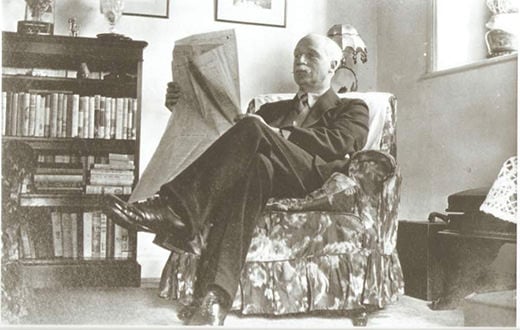
This club is famous for… the birth of the Dambusters
In the golfing world a low, bouncing shot that runs and runs, further than it has any right to, has a fairly accepted nickname – based upon a certain British Olympian.

Face removed to protect Sally’s identity
But at Burhill the members would be forgiven for giving those kind of shots a different name.
At the Surrey course a ball that skips of the surface once, twice, three times brings to mind a wholly-different image – one that helped end the Second World War.

And would you believe it, but the similarity between the golf shot and the bomb is one that was recognised by its inventor – an engineering genius who had a pivotal role to play in Allied Forces’ victory.
Let’s start at the beginning.
Burhill the golf club had been founded in 1907, with a course designed by Willie Park.
But in 1940 the course, complete with its mansion dating back to 1726, was requisitioned by the Ministry of Aircraft Production for the use of the design department of Vickers Armstrong.
Heading up the 200 employees was Barnes Wallis, a teetotal vegetarian whose career began as an apprentice in a shipyard.

Couple of hints in this image, to give you an idea of where this is going
It was Wallis who would develop what he referred to as ’An Engineer’s Way to Win the War’.
While working at Burhill he developed a four-ton ball, named ’Upkeep’, which became the centrepiece for one of the most famous bombing raids in RAF history.
Officially known as Operation Chastise, the mission of May 17 1943 has gone down in history by another name – the Dambusters.

These chaps did the rest
And if you think about it, quite a bit of Wallis’ work actually directly relates to how elite players play golf today.
The backspin his bombs created allowed the bombs to fall slower, landing more gently, and meant they could be better controlled. Rather than skipping off the surface wildly, the backspin meant they hugged the dam – not unlike a professional hitting their ball and it spinning back on the green, gripping tight to the surface.
Bit of science here: the experiments by Barnes Wallis showed the optimum impact of the bomb was 225mph, at 7 degrees to the water, spinning eight times per second.
A well struck wedge will retain backspin as high as 160 revolutions per second as it returns to earth, but slows on first impact, before the spin comes into play on the second and third bounce – acting in a similar way to a bouncing bomb.
Cool eh?
And just in case you were wondering whether Wallis had spotted this link – of course he did! The man was a genius.
The generic name he gave to all of his spinning bombs was – Golf mines.

Well played, Sir Wallis
The bouncing bombs were successful in their mission – destroying the Mohne and Eder dams and disrupting the German munitions and steel productions, helping to weaken the Nazi war effort and bringing about the end of the Second World War.
And all thanks to work that took place at Burhill.
Last week we started a lively discussion with the news that one club’s claim to fame was its devilishly-long par 6 hole. You can read all about it HERE.

This club is famous for… President Eisenhower and the 14th tee

This club is famous for… the Stableford scoring system
Click here for the full ‘This Club Is Famous For’ archive










